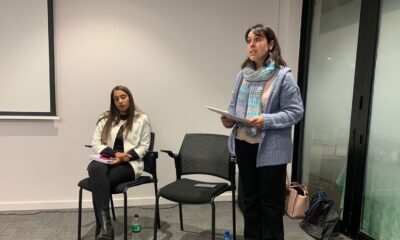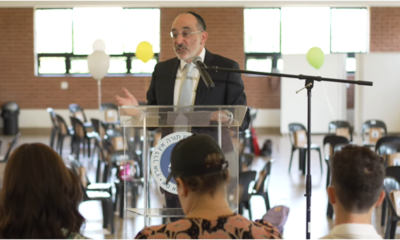
Youth

Bullying is systemic and teachers don’t get it, teens say
Published
1 year agoon
“At my school, you either fit the mould or you don’t. And if you don’t fit in, kids will start to exclude you and talk behind your back. It just builds up from there,” said a Jewish high school student who agreed to speak out on condition of anonymity.
He was one of a number of Jewish students who came forward to shed light on the issue of bullying that school leadership and parents don’t appear to comprehend.
These brave pupils explained that bullying isn’t always intentionally targeted at one particular student, but is rather routine behaviour from bullies. “Often kids will see someone ‘less popular’ and start nudging each other and giggling, just so they have something to talk about,” said one of the students. “It’s almost like they need to use other people just to make conversation”.
Another said, “Our school has a zero-tolerance policy to bullying, but that doesn’t really mean they can stop bullying from happening. What happens is if something major has happened relating to bullying, we’ll have some sort of talk at school, but most kids don’t take these talks to heart.”
These scholars explain that they generally don’t report bullying to school staff because that “a lot of kids feel that the social workers don’t care that much, and sometimes going to them makes the situation worse.
“They don’t feel like it’s a safe enough environment, and are worried that others may find out they have gone for help.”
One of the teens said, “I don’t really know if people are comfortable going and telling teachers unless they have a special connection with a certain teacher and they trust enough to know that they won’t tell anyone.”
Many of the students believe that there isn’t enough practical intervention when issues are reported. “They speak to you about your feelings, but they can’t fix the problem because they’re also thinking about the other child’s feelings. But when you’re actually being bullied, it often feels like nobody believes you.”
Social media allows bullying that begins at school to become inescapable. “It’s different from when our parents were younger. Nowadays, it’s not like you get picked on at school but you’re safe at home. It never goes away. When you’re being bullied at school, you can also be bullied at home. It’s constant. Our phones follow us everywhere, and so much bullying takes place on social media. There’s no safe space for us anymore.”
Additionally, bullying isn’t typically happening in isolated cases with a handful of students. It seems that some schools have a systemic problem that isn’t being solved but is being swept under the rug.
“I don’t think there’s an easy solution because you can’t really change the perspectives and ways of all of these students. But teachers need to be a lot more aware of what’s happening so that they can intervene when something’s wrong,” said a student.
Another believes that it all stems from a culture of entitlement. “There’s a lot of entitlement in students and teachers at my school, and there isn’t much done about it. Sometimes bullying even takes place in the classroom, and teachers and staff participate in the bullying and take advantage of their power over students.” This is particularly prevalent in marginalised groups. “These issues are never really dealt with, just avoided,” they said.
They also explained some of the nuances in the kind of bullying that high school students experience. “Back in primary school there was more ‘normal’ bullying in the sense of, ‘You’re different so I’m going to tease you’. In high school, it’s more like rumours and snide comments and gossip, which is arguably worse,” said one of the teens.
Another said, “In the senior grades, students are old enough to have the subtlety and tact not to bully someone outright, or to have plausible deniability when they do.” Most of the teens the SA Jewish Report spoke to believe that often “the school is too scared to do anything”, and problems begin to snowball from there.
They also feel that teachers should be more responsible for the well-being of students when there’s an obvious issue in their classrooms. “If they hear nasty rumours or see a kid that’s taking strain, they should do something about it. Don’t just bring it up in the staff meeting, ask the kid if they’re okay, if something needs to be reported.” Teachers should also have sensitivity training to understand the issues that students face today.
One teenage girl decided to take matters into her own hands and stand up to her bully when she was excluded from her group of friends. She said, “I always knew that my morals and values were different to theirs, but I wasn’t really going to do anything about it”.
She discovered that these “friends” had created a separate WhatsApp group that they were communicating on for months, one that excluded her. “It was so much more than a WhatsApp group. They were slowly pushing me away.
“I didn’t think too much about it at first,” she said, but when she eventually confronted the admin of the group about it, she was permanently kicked out of the friendship group.
“The worst part is that my best friend stood behind her [the admin bully] and said nothing. At that point, I wondered if she was ever actually a true friend.” Having confronted the bullies, she was able to regain her power, put this group of so-called friends behind her, and go on to make new friends.
The student approached the social worker, who was understanding, but the student didn’t feel that there was anything more that could be done. “In high school, it’s different,” she said. “It’s not like I want the school to call in my parents or anything.”
The student went on to find people who were more accepting. “I was lucky to be able to stand up to the person because a lot of people can’t. I was blessed to be able to understand that that’s not the way I should be treated,” she said. “Looking back at that group, everyone is just so fake and toxic. And those who are still being bullied won’t speak up or do anything about it. I know that a lot of them wish that they could get out of that situation and that they would be so much happier, but they won’t do it. Because in high school, popularity is everything.”
Many students who have experienced bullying find that the only way to solve the situation is to move schools. One student who made the brave decision to change schools this year described how bullying made them feel totally isolated in their previous school. “I had been friends with a particular group of people for the whole of primary school. However, in high school, things seemed to shift and I felt like they were purposefully trying to exclude me. Sitting in a different area without telling me, not inviting me to parties, all that kind of thing.”
After being excluded for quite some time, the student said that their friends began making more pointed attacks. “At one point, one of them told me that I was ‘invisible’, right to my face, which is arguably the worst thing you can say to someone who already feels worthless and small.” What made things worse for the student was the way the bullying was dealt with. “The social worker advised that being separated from this group, being in a separate venue for assessments and speeches, and spending time alone in her office would help to ease my anxiety. But all that did was push me further away from my entire grade and make me feel like my only option was to leave.
“I remember walking through the school on my last day and feeling like a ghost, as if I was already gone and nobody cared. I just wanted to get out of there as soon as possible.” The student has since settled into a new school and found friends who are more welcoming. “I guess I’m kind of thankful to those people for teaching me how friends shouldn’t act,” the student said.










